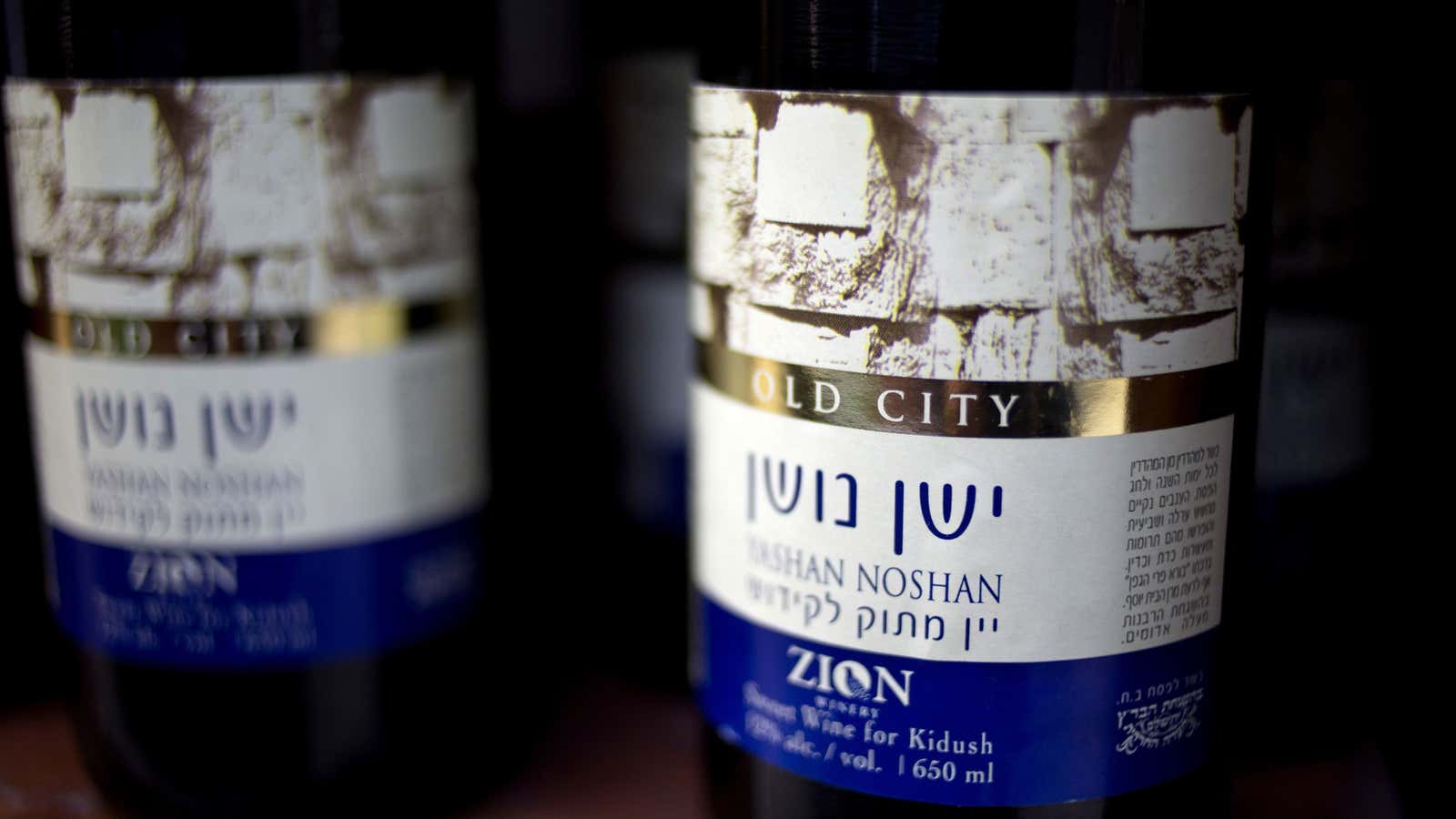Tel Aviv, Israel
Stamping a “Made in Israel” label on boutique wines from the Golan Heights or dates from farming cooperatives just west of the Jordan River will no longer be kosher in European Union states. Under a new EU policy approved on Wednesday (Nov. 11), Israeli goods manufactured on lands conquered in the 1967 war—the West Bank, the Golan, and East Jerusalem—will now have to carry labels saying they originate in the controversial Jewish settlements.
Though Israeli politicians howled, and Palestinians applauded, the direct economic impact of the EU decision will be negligible. The settlements and the industrial zones built across the Green Line make up only 2.4% of Israel’s total manufacturing base, the OECD estimates (pdf, p. 50). And settlement products accounted for only 1.5% of Israel’s $18.3 billion in exports of goods and services to the EU in 2013, according to the Israeli finance ministry.
But there could be longer-term fallout. Might supermarkets in Lyon, Madrid or Manchester face pro-Palestinian boycotts if they carry settlement products? Will politically-minded shoppers even distinguish between goods from “Israel” and from “Israeli settlements”? What if retailers decide to avoid the headache altogether, and stock other products?
The main fear of Israeli experts and officials is of a snowball effect: that European sanctions won’t stop at product labelling and could eventually affect businesses based in Israel proper too. Israel’s finance ministry conducted a study in 2013 on a range of possible sanctions policies, and in the most extreme scenario—a broad European boycott—the ministry predicted Israel’s economy could lose over $5 billion worth of exports (paywall) and 10,000 jobs.
“This is only the first step,’’ Oded Eran, a former Israeli ambassador to the European Union, now a fellow at the Institute for National Security Studies at Tel Aviv University, told Quartz. “Because the next step is that national parliaments will not allow in goods from the settlements… We are seeing the gradual ratcheting-up of European policy on Palestinian statehood and the occupation.”
Up to now, the pro-Palestinian movement for Boycotts, Divestment and Sanctions (BDS) against Israel has notably failed to do any damage to Israel’s economy. While the movement has pulled off public relations coups by, for instance, prompting fizzy-drink maker Sodastream to relocate from a West Bank industrial zone to inside Israel, Israeli exports to the European Union have grown 50% percent since 2005—when the boycott movement began—to 2013.
Though the EU is much more openly critical than the US of Israeli policies toward the Palestinians, it’s been cautious about taking action. About a decade ago it excluded settlement products from the customs exemptions that Israel enjoys as a preferred EU trading partner. Two years ago, it ruled organizations in the settlements ineligible for EU grants and funding. That caution was attributed in part to a desire not to upset peace efforts. And despite the settlement sanctions, EU policy still opposes a broad boycott of Israel.
But since the Israeli government has ruled out a peace agreement with the Palestinians in in the foreseeable future, and continuing to expand settlement-building, the EU is expected to become less reticent about partial sanctions. “It makes them feel they have to teach us a lesson,” said Jonathan Rynhold, a professor of political science at Bar Ilan University.
Israeli right-wing politicians have argued that thousands of Palestinian workers employed in settlement businesses and farms will be the first to get hurt. But Alon Liel, a former Israeli diplomat who supports the European labeling policy as “a dramatic move,’’ told Quartz this argument echoes one that’s been made before. “We remember this from the South African days, the whites said that the first ones to be fired are the blacks,’’ he said. “But Mandela said that we want to achieve bigger things.”
